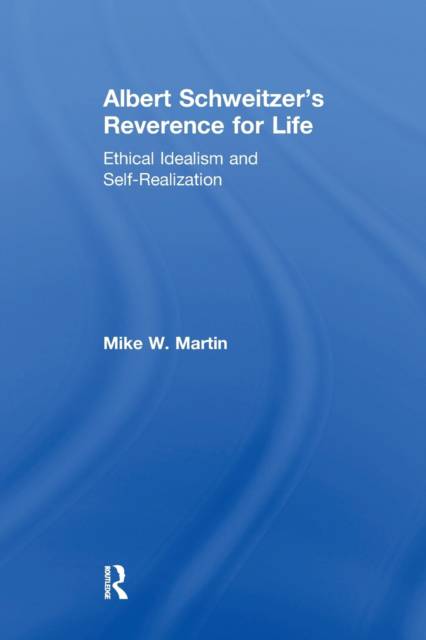
Door een staking bij bpost kan je online bestelling op dit moment iets langer onderweg zijn dan voorzien. Dringend iets nodig? Onze winkels ontvangen jou met open armen!
- Afhalen na 1 uur in een winkel met voorraad
- Gratis thuislevering in België vanaf € 30
- Ruim aanbod met 7 miljoen producten
Door een staking bij bpost kan je online bestelling op dit moment iets langer onderweg zijn dan voorzien. Dringend iets nodig? Onze winkels ontvangen jou met open armen!
- Afhalen na 1 uur in een winkel met voorraad
- Gratis thuislevering in België vanaf € 30
- Ruim aanbod met 7 miljoen producten
Zoeken
Albert Schweitzer's Reverence for Life
Ethical Idealism and Self-Realization
Mike W Martin
Paperback | Engels
€ 56,95
+ 113 punten
Uitvoering
Omschrijving
Albert Schweitzer, philosopher, physician, Nobel Peace Laureate, theologian, and musician, developed a character-oriented ethics focused on self-realization, nature-centered spirituality, and moral idealism which anticipated the current renaissance of virtue ethics. Schweitzer's idea of 'reverence for life' underscores the contribution of moral ideals to self-realization, connects ethics to spirituality without religious dogma, and outlines a pioneering environmental ethics that bridges the gap between valuing life in its unity and valuing individual organisms. In this book Mike W. Martin interprets Schweitzer's 'reverence for life' as an umbrella virtue, drawing together all the more specific virtues, in particular: authenticity, love, compassion, gratitude, justice and peace loving, each of which Martin discusses in an individual chapter. Martin's treatment of his subject is sympathetic yet critical and for the first time clearly places Schweitzer's environmental ethics within the wider framework of his ethical theory.
Specificaties
Betrokkenen
- Auteur(s):
- Uitgeverij:
Inhoud
- Aantal bladzijden:
- 124
- Taal:
- Engels
Eigenschappen
- Productcode (EAN):
- 9781138265493
- Verschijningsdatum:
- 31/03/2017
- Uitvoering:
- Paperback
- Formaat:
- Trade paperback (VS)
- Afmetingen:
- 156 mm x 234 mm
- Gewicht:
- 185 g

Alleen bij Standaard Boekhandel
+ 113 punten op je klantenkaart van Standaard Boekhandel
Beoordelingen
We publiceren alleen reviews die voldoen aan de voorwaarden voor reviews. Bekijk onze voorwaarden voor reviews.











